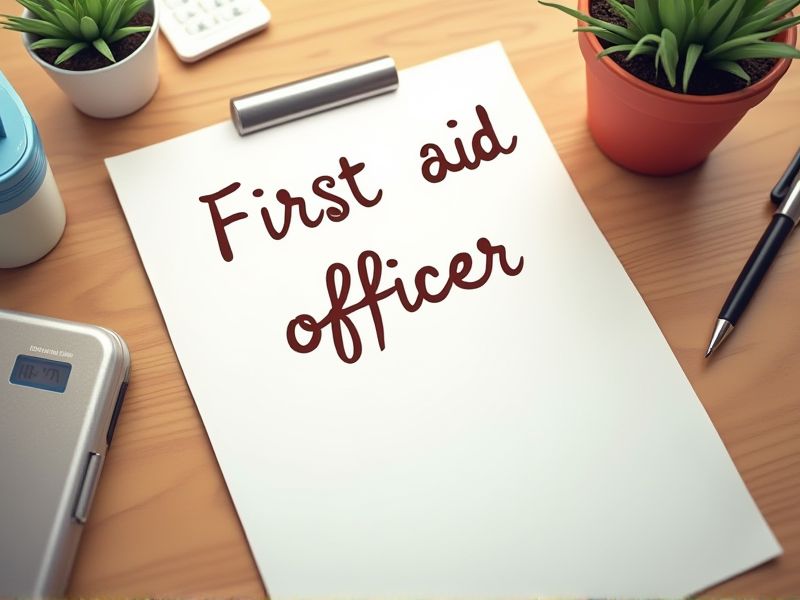
A First aid officer plays a critical role in managing medical emergencies, ensuring immediate and effective care in the workplace or public settings. Possessing certain certifications equips them with the necessary skills and knowledge to handle a variety of situations safely and competently. These certifications validate their ability to assess situations, perform life-saving procedures, and adhere to health regulations. The following are some essential certifications that may be required for a First aid officer.
CPR/AED Certification
CPR/AED certification ensures that a first aid officer is equipped with the necessary skills to respond effectively during cardiac emergencies, which significantly increases the survival chances of individuals experiencing cardiac arrest. Certified officers can confidently operate an Automated External Defibrillator (AED), a critical tool in restoring normal heart rhythm. Proper certification equips officers with updated guidelines and techniques, maintaining adherence to the latest medical protocols. Employers are more likely to ensure a safe environment and adhere to legal requirements when first aid officers hold valid CPR/AED certifications.
Basic First Aid Certification
Having a Basic First Aid Certification ensures a first aid officer is adequately prepared to handle medical emergencies, which reduces the risk of complications. Proper training enables them to provide immediate and effective care, which can improve a victim's chances of recovery. Certification ensures the officer is knowledgeable about the latest first aid protocols, promoting consistent and up-to-date practices. Legal and workplace safety standards often require certification to comply with regulations and ensure a safe environment.
Advanced First Aid Certification
Advanced First Aid Certification equips a First Aid Officer with comprehensive skills to manage complex medical emergencies. This certification enhances the ability to perform life-saving procedures beyond basic first aid, like managing cardiac arrests or severe trauma. It ensures compliance with workplace health and safety regulations, reducing liability concerns. Certification also boosts the confidence of the officer in high-pressure situations, improving response efficiency.
Basic Life Support (BLS) Certification
Basic Life Support (BLS) certification equips first aid officers with essential skills to effectively manage critical emergencies like cardiac arrest. Certified individuals can perform timely interventions such as CPR, which significantly increases the chances of survival for affected individuals. BLS training ensures a standardized level of response, reducing variability in emergency care. Having a BLS-certified first aid officer instills confidence in both the victim and bystanders during emergency situations.
Advanced Cardiac Life Support (ACLS) Certification
Advanced Cardiac Life Support (ACLS) certification equips first aid officers with critical skills to effectively manage complex cardiovascular emergencies. This training enhances their ability to recognize and quickly respond to conditions like cardiac arrest and stroke, improving patient outcomes. It ensures first aid officers are prepared to administer advanced interventions such as defibrillation and medication administration when necessary. Having ACLS certification validates the officer's expertise and readiness, reinforcing confidence among patients and other healthcare team members.
Pediatric Advanced Life Support (PALS) Certification
First aid officers with Pediatric Advanced Life Support (PALS) certification possess essential skills for managing severe pediatric emergencies, which significantly increases survival rates among children. As children have different physiological responses and medical needs than adults, specialized training allows first aid officers to provide appropriate care tailored to young patients. The PALS certification ensures that first aid officers are up-to-date with the latest guidelines and protocols, improving overall readiness in crisis situations. This certification also enhances the credibility and trust in first aid officers, reassuring parents and guardians about the quality of care provided.
Bloodborne Pathogens Certification
Being a First Aid Officer involves managing situations where exposure to bloodborne pathogens is possible, necessitating certification to ensure safety and health compliance. Certification provides essential training on handling potential infectious materials, reducing the risk of disease transmission. It equips first aid officers with protocols and practices that protect both themselves and the individuals they assist. Having this certification ensures adherence to legal and workplace safety standards, promoting a safer environment overall.
Emergency Medical Technician (EMT) Certification
EMT certification equips a first aid officer with advanced emergency medical skills and knowledge, resulting in more effective response during emergencies. Certified EMTs are trained to handle a broader range of medical situations compared to those with basic first aid training, improving patient outcomes. Certification ensures that the officer is familiar with standard procedures and legal protocols, reducing liability risks for organizations. In many jurisdictions, EMT certification is required to meet legal compliance standards for emergency response roles.
Occupational First Aid Certification
Occupational First Aid Certification ensures a first aid officer is adequately trained to handle workplace-specific injuries and emergencies, resulting in enhanced employee safety. Training provides knowledge and skills to accurately assess situations and administer effective treatment, minimizing risks and improving recovery outcomes. Legally, many industries require certified first aid officers to comply with workplace safety regulations, reducing liability and financial consequences for the organization. Certification updates keep first aid officers informed about the latest protocols, ensuring the application of current best practices.
Defibrillation and AED Training Certification
Defibrillation and AED training certification equips a first aid officer with the skills to respond effectively to sudden cardiac arrest scenarios, increasing the likelihood of survival. Proper training ensures the officer can utilize an Automated External Defibrillator (AED) accurately, which is crucial for restoring normal heart rhythms in emergencies. Certification demonstrates that the officer is up-to-date with current best practices and guidelines, ensuring a standardized response during critical situations. Having certified personnel on-site reduces the response time, crucial in cardiac emergencies where every minute impacts survival chances.
Summary
By obtaining certifications, you'll enhance your credibility as a first aid officer, which often leads to increased trust from colleagues and employers. This recognition can result in more opportunities for career advancement or specialized roles within the organization. As your skills and knowledge expand, you'll be better equipped to respond effectively in emergencies, potentially improving patient outcomes. Finally, the certification can foster a sense of personal achievement and confidence in your life-saving abilities.
